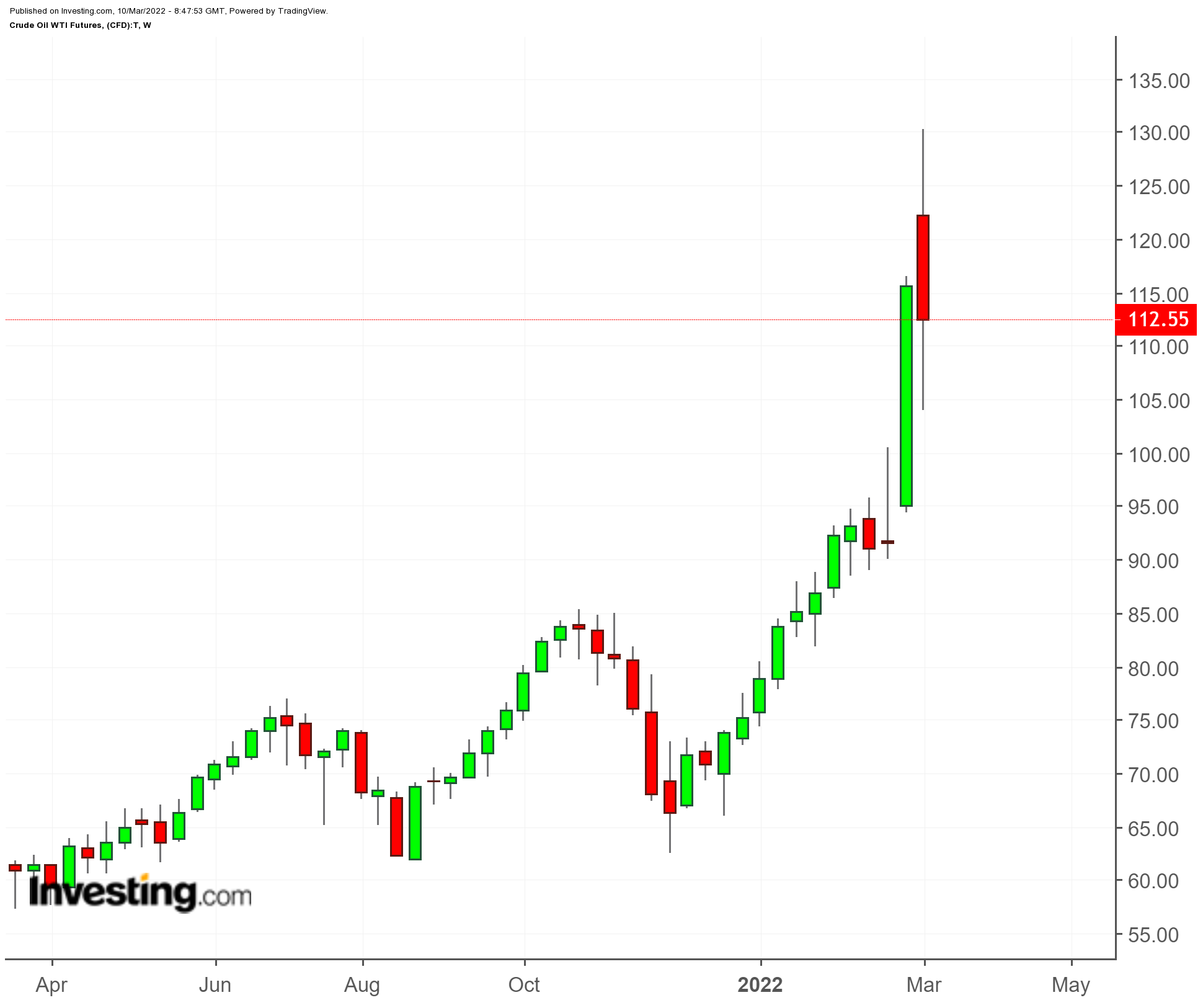Oil prices—Brent and WTI—are well into the triple digits. That is clearly the biggest story of the week, but it’s important to put these high prices into the appropriate historical context.

Before this past week, when oil prices flirted with records, the all-time high for Brent was in the low $130 per barrel range. In July 2008, the Brent spot price was $132.72.
It is valuable to compare today’s prices to summer 2008 while taking into account inflation. For the five business days, ending on Mar. 8, 2022, Brent prices closed at $112.93, $110.46, $118.11, $123.21, and $127.98.
For historical comparison, it is not yet possible to precisely gauge the value of the dollar today, but analyzing these prices for inflation using the January 2022 inflation rate of 7%, last week’s Brent prices would correspond to the following prices in July of 2008: $88.35, $86.42, $92.41, $96.40, and $100.13.
It is clear that prices are high now—especially compared to the recent past—but the value of a barrel of oil is not yet at the levels it reached 14 years ago.
Earlier this week, JP Morgan announced that it could see $185 per barrel of oil by the end of the year. Goldman Sachs said $175. Of course, these forecasts must always be taken with a grain of salt. (Goldman also forecasted $175 per barrel in March of 2008.) These forecasts do raise the important question, though:
Will oil prices continue to rise and how high?
Ukraine – Russia
A quick solution to the Ukraine – Russia conflict would relax the oil market. There are strong suggestions that Russia’s major objectives in invading Ukraine have been to prevent NATO from expanding and to exert control over Crimea.
It seems that NATO has rebuffed the most serious requests for support from Ukraine, including air support and possibly membership. Ukraine is not a NATO member and Russia wants to ensure that it never is. In this regard, it seems that Russia could be satisfied.
Russia invaded Crimea back during the Obama administration, and Ukraine has not really had control over the region since then. If Ukraine and Russia agree to serious negotiations, and if each is eager to end the fighting, it is not unreasonable to believe Ukraine will assent to Russian control over Crimea.
If the conflict does end quickly—and no one knows when it will end, despite the prevailing opinion in the media—the market will be relieved. That will be a signal that the price of oil can drop.
Russian Oil And Gas To Europe
As Biden admitted in his Tuesday speech, Europe probably cannot afford to cut itself off from Russian energy supplies. Doing so would mean a serious lack of power and fuel. The continent would suffer, and the rest of Europe does not appear willing to suffer like that for Ukraine. Therefore, at some point, the market will probably conclude that Russian oil and gas will continue to sell.
Biden issued an executive order banning Russian oil and products from the US (subject to a 45 day drawdown period which allows quite a bit of flexibility). But Russia does not supply enough crude oil to the US to significantly alter the market with this executive order. In fact, the oil market and the stock market seemed satisfied to simply have some clarity after Biden’s announcement.
Demand Destruction
Demand destruction is always a threat when prices rise precipitously. At what price point will demand drop enough in reaction to the prices to be noticed by the market? Already, one airline has claimed it is canceling flights because of the high prices for jet fuel.
With high oil and gas prices, we don’t know if travelers will change plans in North America and Europe. There was an expectation of more travel as people globally return to a normal life post-pandemic, but we don’t know what price is too high for gasoline and jet fuel. We don’t yet know the price point at which consumers will prefer to stay home, especially because inflation is distorting prices.
We also don’t know at what point high fuel costs will hurt the economy, although we are starting to see some important signals of this. In Europe, steel producers are starting to cut back on production because of high electricity prices. With already high inflation and supply chain problems globally, the surge in oil and gas prices is a real threat to global economic growth. If the economy turns bad, demand will fall.
Speculation
However, traders make (and lose) money when the market moves up and down. Some speculators are having a field day now, and only a fool would claim to know the precise end of this wild ride upward.
